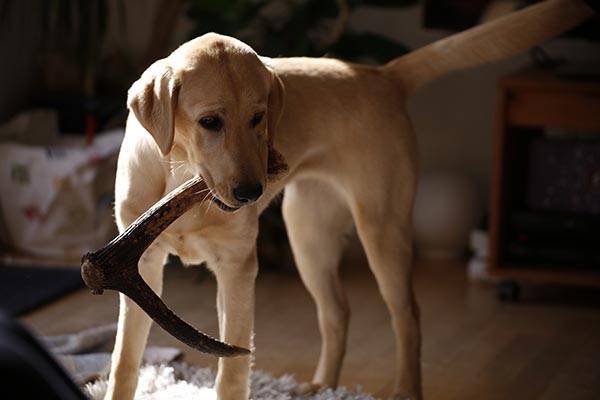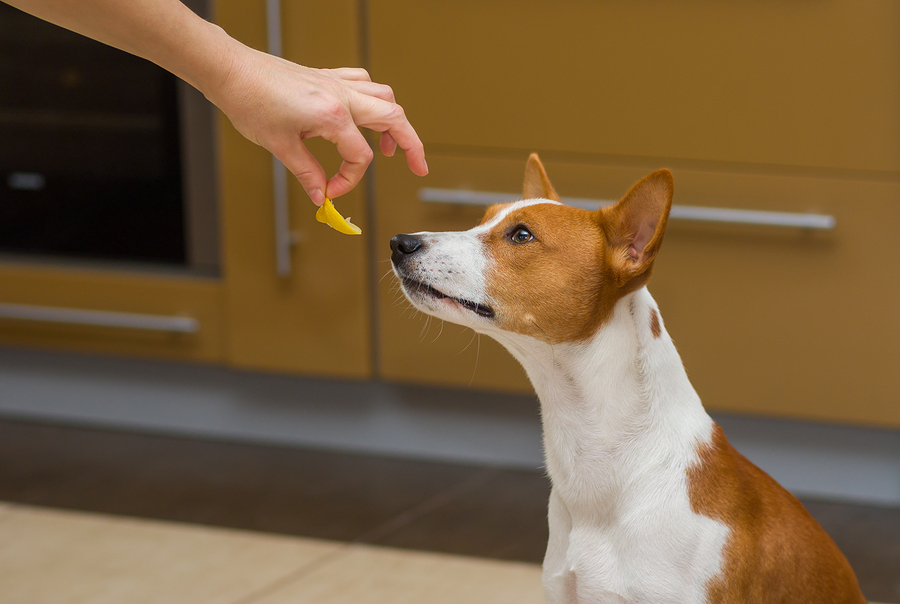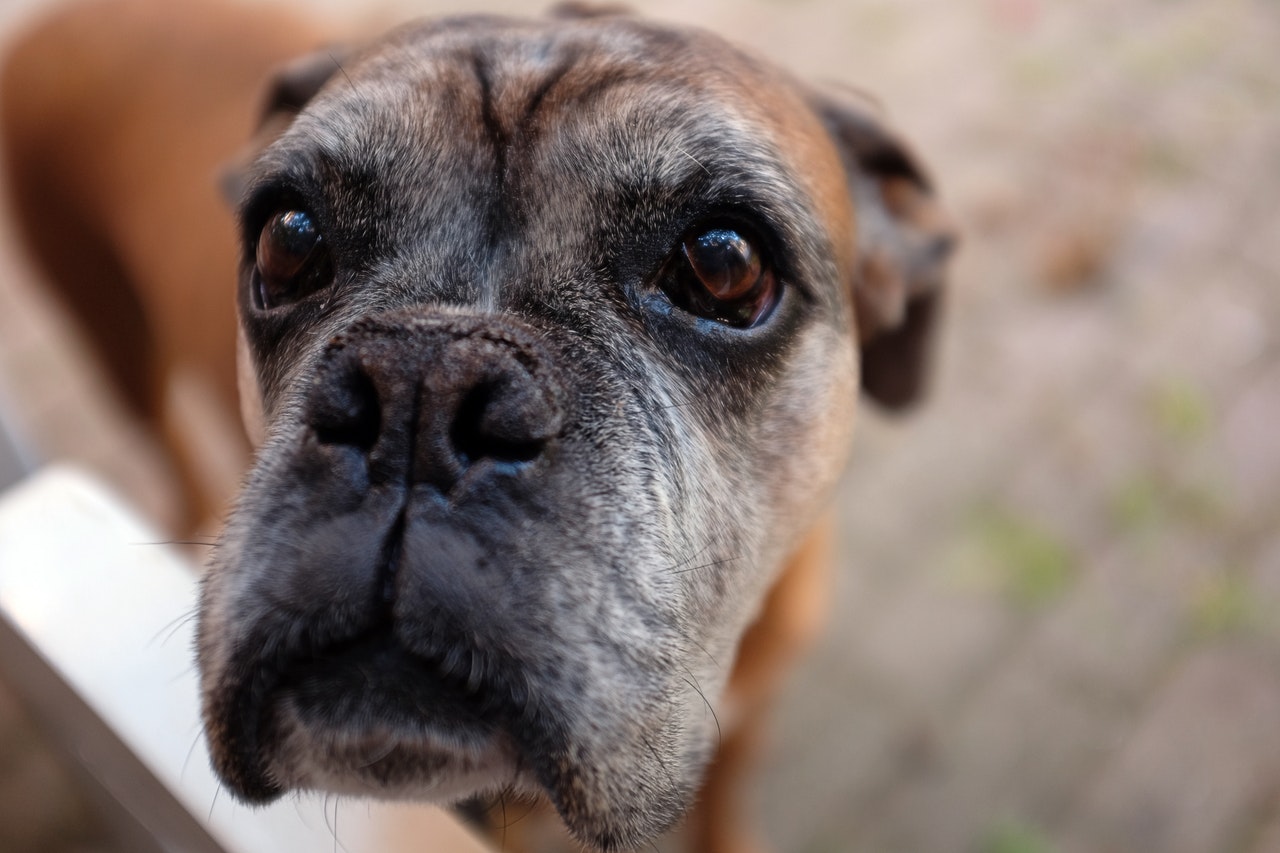Have you ever given your dog milk to drink? Maybe he lapped up some milk from your cereal bowl when you weren’t looking. Or maybe he sneaked a piece of pizza off the coffee table during the big game, when everyone was excited about that goal! It happens! If your dog has milk or other dairy products, have you noticed he doesn’t seem to feel well afterwards? This could be a sign your fur baby is lactose intolerant. We’ll take a look at this later in the article, but first, what is lactose?
Connect with a verified veterinarian in minutes. Licensed vets are available 24/7 to answer your questions. No need to worry about your furry family member.
Dog Lactose & Lactase—What are They?
Lactose is a type of sugar found in the milk of mammals. In order to digest lactose, a baby or adult mammal needs to have an enzyme called lactase, which breaks down the lactose, making it easier for the digestive system to process these molecules. Human and animal babies, including puppies, typically have enough lactose in their systems to make digesting their mother’s milk no problem. However, when the baby is weaned, the levels of lactase decrease significantly. They can still have milk, but only a little at a time. Even so, older puppies, human kids and adult dogs and their pet parents may have such low levels of lactase that their digestive systems are unable to break down the lactose in dairy foods. This condition is called lactose intolerance.
What is Dog Lactose Intolerance?
Humans and other animals, including dogs, can suffer from this condition.
Lactose intolerance is a medical condition where the body doesn’t produce enough lactase to breakdown the lactose molecules. When this happens, the lactose is not tolerated well and can cause unpleasant symptoms.

Review symptoms, medications & behavior to keep your pets healthy with a Vet Online in just minutes.
Ask a Vet Live NowDogs Lactose Intolerance Symptoms
Lactose intolerance can cause some disagreeable symptoms in dogs. These symptoms may include:
- Abdominal pain
- Bloating
- Diarrhea
- Extreme thirst
- Vomiting
- Weakness
- Weight loss
- Dehydration
- Potty accidents in the house
Symptoms can sometimes be mistaken for a stomach virus or another condition. However, if you notice these types of reactions every time your pup eats dairy, then it may be due to lactose intolerance, rather than a tummy bug.
What Happens if a Dog Drinks Milk?
Your fur baby will suffer lactose intolerance symptoms because his body doesn’t produce the lactase needed to break down the lactose molecules in the milk, or other dairy products, he’s ingested. His intestines are not able to digest the lactose molecules, which leads to unpleasant symptoms. Symptoms will vary from dog to dog, depending on how sensitive they are to milk. Actually, it comes down to the amount of lactase his body produces. Some dogs may not have any symptoms from eating a little bit of ice cream, for instance. However, another dog may get really sick from just one lick. It just depends on the dog’s body.
What Percentage of Dogs are Lactose Intolerant?
That’s an excellent question! We did the research and weren’t able to come up with an accurate percentage. However, many resources do say that most dogs are lactose intolerant to some degree. That came as quite a surprise! As noted in the previous section, dogs and the amount of lactase they produce determines how bad their symptoms will be after eating dairy products. It also depends on the amount of lactose in the food they eat.
Amount of Lactose in Dog Food
The amount of lactose varies from food to food; in other words, the higher the amount of lactose, the more symptoms a dog can have. So, how do you know how much lactose your dog’s getting in any specific food? This is where reading labels comes in to play. If your pup can tolerate some dairy products with relatively no symptoms, then changes are these foods are lower in lactose.
If he eats foods with higher amounts of lactose, you’ll see your poor buddy heading for the door to get sick and possibly have diarrhea. Not fun.
If you read the food labels, you should see a listing of how much lactose is contained in each dairy product. Here are some examples:
- Butter: is low in lactose; it usually contains anywhere from .8% to 1%. Be aware, though, that the fat and salt content are usually too high for most dogs, so don’t feed it to them too often. A small piece of toast with butter is OK once in a while, but not on a regular basis.
- Cow’s milk: contains about 5% lactose, making it hard for puppies to digest. Lactose is not lost in the pasteurization process. Even fat free and low fat milk can have too much lactose for some dogs.
- Cheese: the good news here is that processing milk into cheese lower the amount of lactose. But be careful; cheeses such as American and Colby contain a high level of lactose. If your dog loves cheese and is lactose intolerant, then cheeses such as Limberger or Muenster might be a better bet, as they’re lower in lactose.
- Ice cream: almost every dog’s dream—having a lovely ice cream cone to lick and enjoy! The process of creating ice cream from milk can lower the amount of lactose, but it can also cause the lactose levels to increase. Another issue are the large amounts of fat and sugar in ice cream. If your fur baby just has to have ice cream, make this an occasional treat. You could save this wonderful treat for special occasions such as holiday and birthdays, too.
- Yogurt: while processing milk into yogurt does not lower lactose, yogurt does contain enzymes that can work to help your pup break down the lactose. In fact, yogurt is often tolerated better than other dairy products in dogs that are lactose intolerant. In fact, you might consider trading in frozen ice cream for a frozen yogurt treat for your fur baby when he craves some ice cream!
So, reading labels can help determine which types of dairy may be better choices for your furry canine companion. Just remember that the lower the amount of lactose in the product, the better tolerated it will be and the fewer lactose intolerant symptoms your dog will have. And when you do give your dog dairy products, be sure to monitor him for lactose intolerance symptoms. Symptoms can come on within 30 minutes of eating a food, or they may present a few hours later—it depends on the dog. Just watch your pup and see if he has any problems after eating dairy.
Can Dogs Eat Foods Made for Lactose Intolerant Humans? Do They Make Dog Lactose Intolerant Cheese?
Technically, yes, your pup can eat lactose dairy products made for humans. This can include milk, lactose-free cheese. However, keep in mind that these products may contain other ingredients that are not healthy for your dog. These can include fats, sugars (think ice cream), salt and more. If you have any questions about whether or not a food is safe for your dog, be sure to ask your vet. They’ll have the best and most reliable information about your pup and what’s best for his health.
Dog Dairy Allergy
One thing to keep in mind is that a few dogs have a real dairy allergy. That is they have an allergic reaction to dairy foods; this is more than an intolerance. A food allergy is not caused by the lack of lactose in the body. Instead, it’s a reaction by the immune system to a harmless substance it views as harmful. During an allergic reaction, the body (dog or human) creates antibodies to these substances, trying to fend off what it views as an invader in the body.
Symptoms of a dairy allergy can be similar to those of lactose intolerance, but also generally includes:
- Itchy skin: your dog may chew and scratch his skin to find relief
- Sneezing
- Hot spots: can develop from furious scratching and biting that break the skin, allowing bacteria to enter
- Skin rash or hives
- Eye discharge
- Red eyes
- Diarrhea
- Vomiting
- Loss of hair
- Ear infections
Along with the digestive trouble, your dog will suffer these other symptoms, too. Dairy is one main the offenders when it comes to allergies in dogs. Food allergies in dogs can be inherited, too. In fact, some dog breeds are more prone to allergies than others, including:
- West Highland White and Wheaten Terriers
- Shar Peis
- German Shepherds
- Miniature Schnauzers
- Spring and Cocker Spaniels
- Rhodesian Ridgebacks
If you believe your fur baby may be suffering from a dairy allergy, stop feeding him dairy products. It may also be a good idea to get in to see the vet, as they may want to run allergy tests, especially if the symptoms are quite severe. Treatment of dairy allergies generally involves avoidance of the offending foods. Or the vet may advise an elimination diet. These diets involve removing all foods containing the ingredients that cause the allergic reaction for up to three months. Most dogs’ allergy symptoms will improve in about 4-6 weeks. Some vets may discontinue the elimination diet at that point, while others may recommend continuing the diet for up to 8-12 weeks.
During an elimination diet, you’ll have to strictly monitor all the foods your dog eats and watch for any symptoms. This includes everything from dog food to snacks and everyone in the household must be careful of what they feed your fur baby. If your pup improves on this diet, the vet may say it’s OK to add the ingredient back into your dog’s diet a little at a time. Or they may recommend avoidance of dairy for the rest of your dog’s life. It depends on how severe the allergic reaction is, your dog’s overall health, etc.
As you can see, dogs can suffer from lactose intolerance or even dairy allergies after eating dairy food. If your pup suffers from lactose intolerance, be sure to read food labels and choose those dairy products that have lower amounts of lactose. Yogurt is usually the best choice. If you suspect your fur baby has allergies, be sure to get him to the vet for an exam. He may need to have allergy tests and eat a special diet to help him feel better.
Connect with a verified veterinarian in minutes. Licensed vets are available 24/7 to answer your questions. No need to worry about your furry family member.

Tom
Tom has always loved to write since he was little - he wanted to be either a writer or a veterinary doctor, but he ended up being a professional writer while most of his works are based on animals. He was born in San Francisco but later moved to Texas to continue his job as a writer. He graduated from the University of San Francisco where he studied biotechnology. He is happily married and a soon to be father!
Review symptoms, medications & behavior to keep your pets healthy with a Vet Online in just minutes.
Ask a Vet Live Now



